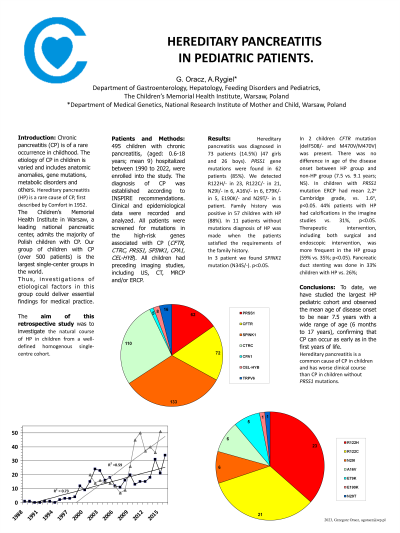Tuesday Poster Session
Category: Biliary/Pancreas
P2868 - Clinical Course of Hereditary Pancreatitis in Pediatric Patients
Tuesday, October 24, 2023
10:30 AM - 4:00 PM PT
Location: Exhibit Hall

Has Audio
- GO
Grzegorz Oracz, MD, PhD
Children's Memorial Health Institute
Warsaw, Mazowieckie, Poland
Presenting Author(s)
Award: Presidential Poster Award
Grzegorz Oracz, MD, PhD
Children's Memorial Health Institute, Warsaw, Mazowieckie, Poland
Introduction: Hereditary pancreatitis (HP) is a rare cause of CP, first described by Comfort in 1952. HP is an autosomal dominant disorder with penetrance of approximately 80-90%. In 1996, association between HP and mutation (p.R122H) in the cationic trypsinogen gene (PRSS1) was described by Whitcomb. HP develops mainly in childhood. The HP prevalence was estimated at 0.3-0.57/100 000 for HP patients. We reviewed our experience over the last 30 years.
The aim of our study was to evaluate the clinical course of HP in children.
Methods: 495 children with chronic pancreatitis, hospitalized since 1990 to 2022, were enrolled into the study. The medical records of these patients were reviewed for data on the presentation, diagnostic findings and endoscopic treatment. The diagnosis of CP was established according to INSPIRE recommendations. All patients were screened for mutations in the high-risk genes associated with CP. Diagnosis of HP was made when PRSS1 gene mutation was found or the patient satisfied the requirements of the family history.
Results: Hereditary pancreatitis was diagnosed in 73 patients (14.5%) (47 girls and 26 boys). PRSS1 gene mutations were found in 62 patients (85%). We detected R122H/- in 23, R122C/- in 21, N29I/- in 6, A16V/- in 6, E79K/- in 5, E190K/- and N29T/- in 1 patient. Family history was positive in 57 children with HP (88%). In 11 patients without mutations diagnosis of HP was made when the patients satisfied the requirements of the family history. In 3 patient we found SPINK1 mutation (N34S/-). In 2 children CFTR mutation (delF508/- and M470V/M470V) was present. There was no difference in age of the disease onset between HP group and non-HP group (7.5 vs. 9.1 years; NS). In children with PRSS1 mutation ERCP had mean 2,2o Cambridge grade, vs. 1.6o, p< 0.05. 44% patients with HP had calcifications in the imagine studies vs. 31%, p< 0.05. Therapeutic intervention, including both surgical and endoscopic intervention, was more frequent in the HP group (59% vs. 35%; p< 0.05). Pancreatic duct stenting was done in 33% children with HP vs. 26%; p< 0.05.
Discussion: 1.This study shows that children with HP develop a significantly more severe clinical presentation of the disease than patients without PRSS1 mutations, despite the same age of disease onset.
2. There is geographic diversity in PRSS1 gene mutation distribution among patients with HP. The most common PRSS1 mutations in Poland are p.R122H and p.R122C, found in a similar percentage of patients.
Disclosures:
Grzegorz Oracz, MD, PhD. P2868 - Clinical Course of Hereditary Pancreatitis in Pediatric Patients, ACG 2023 Annual Scientific Meeting Abstracts. Vancouver, BC, Canada: American College of Gastroenterology.
Grzegorz Oracz, MD, PhD
Children's Memorial Health Institute, Warsaw, Mazowieckie, Poland
Introduction: Hereditary pancreatitis (HP) is a rare cause of CP, first described by Comfort in 1952. HP is an autosomal dominant disorder with penetrance of approximately 80-90%. In 1996, association between HP and mutation (p.R122H) in the cationic trypsinogen gene (PRSS1) was described by Whitcomb. HP develops mainly in childhood. The HP prevalence was estimated at 0.3-0.57/100 000 for HP patients. We reviewed our experience over the last 30 years.
The aim of our study was to evaluate the clinical course of HP in children.
Methods: 495 children with chronic pancreatitis, hospitalized since 1990 to 2022, were enrolled into the study. The medical records of these patients were reviewed for data on the presentation, diagnostic findings and endoscopic treatment. The diagnosis of CP was established according to INSPIRE recommendations. All patients were screened for mutations in the high-risk genes associated with CP. Diagnosis of HP was made when PRSS1 gene mutation was found or the patient satisfied the requirements of the family history.
Results: Hereditary pancreatitis was diagnosed in 73 patients (14.5%) (47 girls and 26 boys). PRSS1 gene mutations were found in 62 patients (85%). We detected R122H/- in 23, R122C/- in 21, N29I/- in 6, A16V/- in 6, E79K/- in 5, E190K/- and N29T/- in 1 patient. Family history was positive in 57 children with HP (88%). In 11 patients without mutations diagnosis of HP was made when the patients satisfied the requirements of the family history. In 3 patient we found SPINK1 mutation (N34S/-). In 2 children CFTR mutation (delF508/- and M470V/M470V) was present. There was no difference in age of the disease onset between HP group and non-HP group (7.5 vs. 9.1 years; NS). In children with PRSS1 mutation ERCP had mean 2,2o Cambridge grade, vs. 1.6o, p< 0.05. 44% patients with HP had calcifications in the imagine studies vs. 31%, p< 0.05. Therapeutic intervention, including both surgical and endoscopic intervention, was more frequent in the HP group (59% vs. 35%; p< 0.05). Pancreatic duct stenting was done in 33% children with HP vs. 26%; p< 0.05.
Discussion: 1.This study shows that children with HP develop a significantly more severe clinical presentation of the disease than patients without PRSS1 mutations, despite the same age of disease onset.
2. There is geographic diversity in PRSS1 gene mutation distribution among patients with HP. The most common PRSS1 mutations in Poland are p.R122H and p.R122C, found in a similar percentage of patients.
Disclosures:
Grzegorz Oracz indicated no relevant financial relationships.
Grzegorz Oracz, MD, PhD. P2868 - Clinical Course of Hereditary Pancreatitis in Pediatric Patients, ACG 2023 Annual Scientific Meeting Abstracts. Vancouver, BC, Canada: American College of Gastroenterology.

